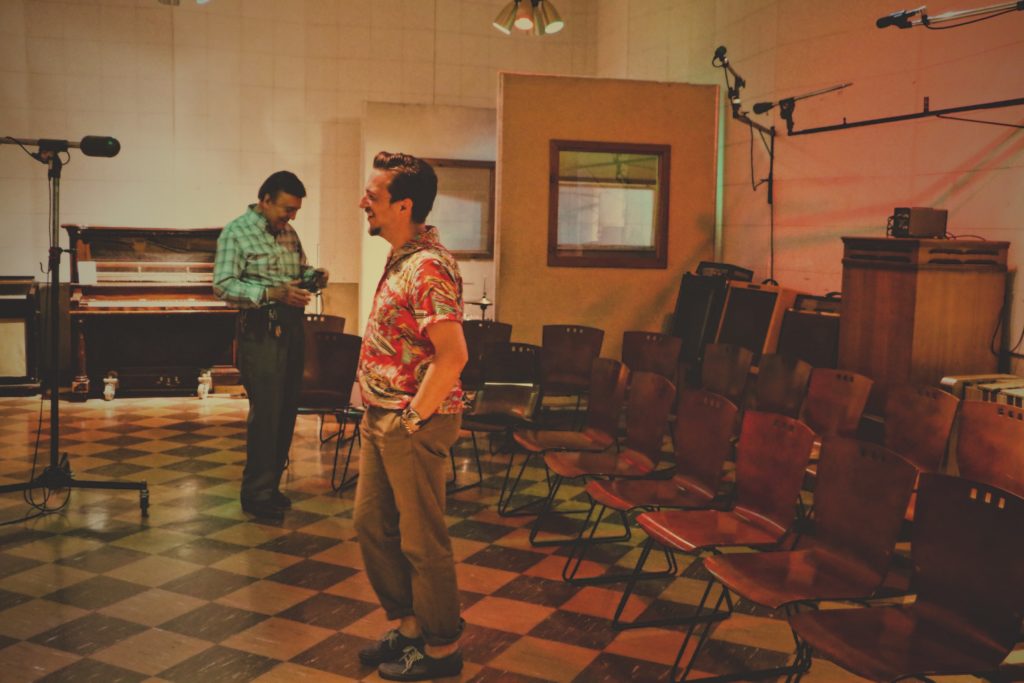
RCA Studio B is no longer the hit factory it was when it opened 60 years ago in Nashville but some modern musicians are still recording there, seeking its signature sound.
According to the folks who run the place, it’s those artists, and even daily tourists, who may literally be keeping that sound alive.
This fall JD McPherson scored a number one on the Americana charts with his song “Lucky Penny” recorded at Studio B. 60 years ago a song by Don Gibson became the first number one country hit ever recorded there. These two recordings are connected by a unique tone that echoes through the tracks and across time.
Studio B’s reverb chamber sits above the iconic building and has heard the voices of Elvis Presley, Dolly Parton and Roy Orbison all bounce around its walls.
When we visited the site, a new ladder had been erected outside allowing studio manager Justin Croft to show off the rarely seen space.
The room is about ten by twelve feet and sits empty save a speaker and some microphones set up in one corner to capture its famous echo. Croft says its wavy walls and hard, reflective surface help create the classic reverb heard on early recordings by Elvis and the Everly Brothers, including their classic “Dream”
That song is one of the tracks heard on daily tours of Studio B, which Croft notes will sometimes end for certain groups by doing a quick recording session using some of the same equipment once employed by legendary artists.
He says the instruments, microphones and studio gear need to be used.
“if you don’t use it, it sort of starts to break down,” Croft says. “So by using it, you keep it going, you keep it alive. It’s almost like if you put, say our piano – if you put that great Steinway in a case, it’s almost like putting it in a coffin. You know? It’s like… it’s over.”
As if the building had a voice
When JD McPherson was allowed to make his new album at Studio B through a special agreement, he used some of that historic gear, including the piano. Sitting forward in a vintage chair in the studio lounge, McPherson refers to the building as if it had a voice in how his songs turned out.
“There was one song that Ray Jacildo, our keyboard player, and I wrote here on the piano, that wouldn’t have existed in any other studio,” McPherson recalls. “It’s called ‘Jubilee.’ That song was directly informed by that piano, that room, what it felt like to be in that room… That’s one that really sticks out to me as the actual song wouldn’t have occurred anywhere else.”
In order to use the studio, McPherson had to record after tourists were done for the day, setting up in the evening and tearing down sometimes at sunrise. He says his band was inspired by the restrictions and the surroundings but not necessarily in the way he expected.
“That’s the strange thing about this experience,” McPherson says. “The first day when we loaded in, we had a song ready to go and in my mind, we were gonna make a song that sounded like it came out of a classic Studio B session. With big timpani drums and all kinds of like orchestration and stuff. And I’ll just say the longer we were here, the louder and fuzzier everything got. I don’t know. It’s almost like – I don’t know if it was us or the building, something wanted to go slightly irreverent (laughs).”
Surrounded by condos
McPherson says when it comes to the building itself and preserving these types of spaces, he’s a “particular sort who thinks about this kind of stuff a lot.”
He says it’s a “miracle” that it still exists. The studio is now preserved, Decades after it was originally shut down, through a partnership with the Country Music Hall of Fame. He also mentions the recent effort to save what was known as Studio A, which sits next door and was set to be demolished before an effort led musician Ben Folds kept it alive. It is now a fully operational studio again and the home of producer Dave Cobb who has recorded Jason Isbell and Chris Stapleton there.
But, McPherson indicates that some of the other buildings along Nashville’s famed Music Row feel more threatened now than ever. There are still recording studios and music businesses up and down the street but those are slowly being surrounded by glass walled condos and high end hotels.
McPherson says, even in the era of laptop recording and home studios, he sees the value of saving spaces that have stories.
“There’s another very old studio that’s still standing that’s not being used right now in town and I’ve driven by that more than once trying to figure out how can somebody get this thing going again?” McPherson questions. “It happens every day. Something is owned by somebody that wants to do something else with the property and it goes away. But, if I had the Van Halen bucks I’d buy ’em all up and get ’em all running again (laughs).”


